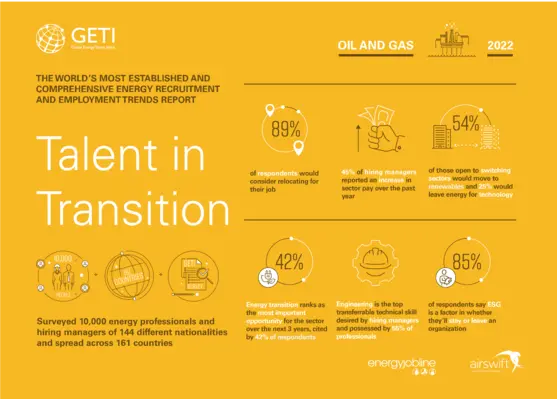The sixth annual Global Energy Talent Index (GETI) has revealed that rising concerns over climate change could trigger a skills exodus from oil and gas to renewables
The report by Airswift, the global workforce solutions provider to the STEM industries, and Energy Jobline, the world’s leading jobsite for the energy and engineering industries found that 82% of oil and gas professionals would consider leaving for another energy sector within three years and the majority (54%) would choose renewables. And the talent migration is already underway with 28% of those who joined the renewables sector in the last 18 months transitioning from oil and gas.
This is partly driven by rising concerns over climate change, with environmental, social and governance (ESG) factors now the second biggest driver behind cross-sector career moves. Those oil and gas majors that are slowest to adopt clean energy could therefore be most at risk of mass resignations, with 28% of survey respondents reporting that their organisation has not changed direction to adapt to the energy transition. With investors increasingly spurning fossil fuels and some major projects and pipelines being cancelled, professionals now rank the transition to clean energy second only to COVID-19 as the biggest challenge to oil and gas over the next three years.
 Yet among the 42% that say their organisation has pivoted to clean energy, 82% feel positive about this change. Oil and gas workers also awarded their companies a high average of 3.53 out of 5 stars for performance on environmental issues. 89% of all professionals would also consider moving within the sector, indicating that companies with strong ESG credentials could attract workers from both within and outside the industry. This suggests that current oil and gas decarbonisation efforts are popular with professionals and that further diversifying energy portfolios could boost employee satisfaction, recruitment, and retention.
Yet among the 42% that say their organisation has pivoted to clean energy, 82% feel positive about this change. Oil and gas workers also awarded their companies a high average of 3.53 out of 5 stars for performance on environmental issues. 89% of all professionals would also consider moving within the sector, indicating that companies with strong ESG credentials could attract workers from both within and outside the industry. This suggests that current oil and gas decarbonisation efforts are popular with professionals and that further diversifying energy portfolios could boost employee satisfaction, recruitment, and retention.
With greater investor and political support for green energy, renewables salaries are also increasingly attractive to oil and gas workers. 40% of renewable professionals received a pay rise last year and only 11% saw salaries fall, whereas just 31% of oil and gas professionals saw pay rise and 21% got a pay cut.
Janette Marx, chief executive officer at Airswift, said, “An ambitious, environmentally-conscious generation of energy workers is an easy target for renewables recruiters and oil and gas workers increasingly have skills transferrable to sectors like offshore wind. However, this is also an opportunity for oil and gas firms to attract talent from the renewable sector by promoting the decarbonisation and diversification of their portfolios.
“Oil and gas companies could retain talent by offering more internal transfers to green energy divisions, combining career progression opportunities with ESG. The sector should continue to promote its role in global development efforts and as a bridge to clean energy, supplying transition fuels and providing key assets for offshore wind projects.”
Airswift and Energy Jobline interviewed sector experts and surveyed 10,000 energy professionals and hiring managers in 161 countries across five industry sub-sectors: oil and gas, renewables, power, nuclear and petrochemicals. The report is available to download at https://www.getireport.com.








